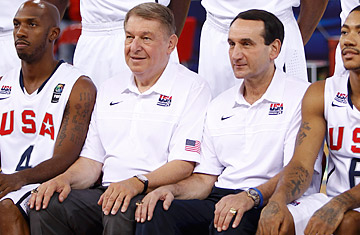
USA Basketball's chairman of the board Jerry Colangelo (2nd L) sits with head coach Mike Krzyzewski (3rd L) and players Chauncey Billups (L) and Derrick Rose as a team photo is taken before the team's FIBA Basketball World Championship game against Tunisia in Istanbul September 2, 2010.
It's hours before Team USA's semifinal game against Lithuania in the 2010 FIBA World Championship in Istanbul and the man appointed to restore America's tarnished image in the basketballing world is wearing a white sweatsuit and sipping coffee beside the lapping cobalt waters of the Bosphorus. The location, a narrow strait that represents the borderline of East and West, makes a fitting site for 70-year-old sports mogul Jerry Colangelo to reflect on the rising tide of global basketball, and America's place in it. The longtime NBA executive and former owner of the Phoenix Suns and Arizona Diamondbacks was brought in as the national director of USA Basketball in 2005 after disappointing U.S. finishes in the 2002 World Championships and the 2004 Olympics. Colangelo was in Istanbul with a young USA squad that would eventually win America's first FIBA World Championship since 1994 on Sept. 12. Still, says Colangelo, American dominance in basketball is a thing of the past. "The gap has closed."
TIME: What was your first experience with the international basketball community?
Jerry Colangelo: I went behind the Iron Curtain back in the '80s to recruit a power forward. I remember everything was gray; the buildings, the sky, even the people. In the negotiations with his coaches, we had vodka in shot glasses with Coke chasers. Before we started, we drank a toast to everyone there so that was six shots right off the bat. Things got looser from there. (As Colangelo tells it, the prospect he was there to sign never made it in the NBA due to a predilection for "Twinkies and American girls.")
Now there are more and more foreign players in the NBA and the game is growing in popularity all over the world. Where do you see the sport going?
The NBA has been going global for quite some time now and it's clearly the leader in the world market. We made some inroads in the '80s and '90s now we're seeing that payoff. Basketball is fashionable and now our NBA games are played around the world with tremendous exposure. Soccer is the number one sport in the world, but basketball is number two — a solid number two.
Before you took over, Team USA was criticized — even ridiculed — for underperforming in international competitions. What caused this losing streak?
After about 1996, we got lackadaisical. At Athens, we really hit rock bottom. The program had dissipated and it wasn't an "in" thing to represent the country. We needed to show respect for the world basketball community. We needed to put together a real program, not an all-star team that shows up and dominates. We had to change the culture of the program.
Why did you take the job? Did you have any pre-conditions?
I was upset by the status of USA basketball. We needed to bring the pride back. And I thought if I was given an opportunity to work with autonomy, I would take it. I would make the calls and pick the coaches and players. That's the only way I've ever done business.
I meet with each player and tell them all the same thing: I'm from a poor Italian family from the southside of Chicago and I lived in a house my grandfather made out of boxcars. If I've had any success it was through hard work, commitment and passion and those are the values I asked them to bring to the program. I ask them to buy in and we go from there.
Slowly we've been able to turn the attitude around. We are the champion in 16, 17, 18 and 19 year old teams. So the pipeline is full of talented young players that aspire to represent their country.
This team you brought to Istanbul has none of the players from the gold medal team in 2008, and the biggest names — like Lebron and Kobe — took a pass. How was the team responded to the big superstars sitting it out?
I've gotten really tired of hearing about who's not here. We have a great team with great young legs. I describe this team as low maintenance, high energy and really excited to be here. If we win this it will be an incredible achievement.
This year's FIBA event is its biggest and most popular ever. Officials say more than one billion people in 183 countries have watched on TV. What can America learn from this tournament?
I'd like Americans to see just how big the game has become in the world and how much other countries love it. What's going on in the stands here is quite a story. There is real love for the game here and there is a real sense of national pride that these fans are showing.
What is the most important change you'd like to bring to Team USA?
From now on, we will never ever take an international competition for granted. We will win, but it's also about how we win.
